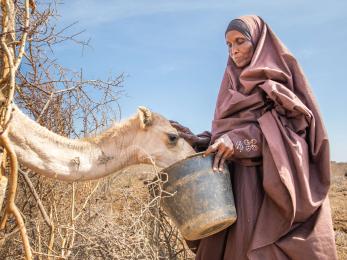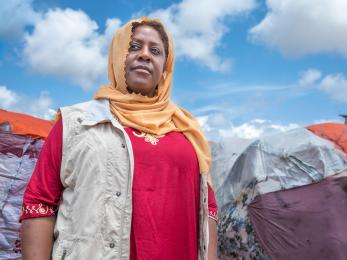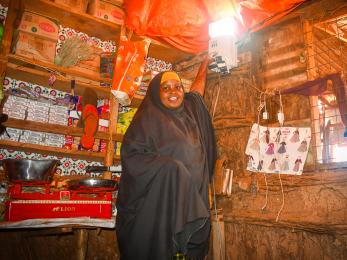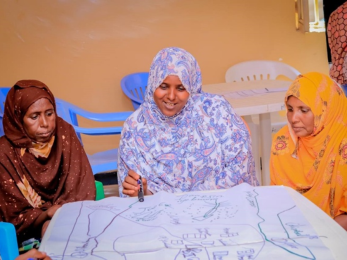USAID Somalia Resilience Population Measurement
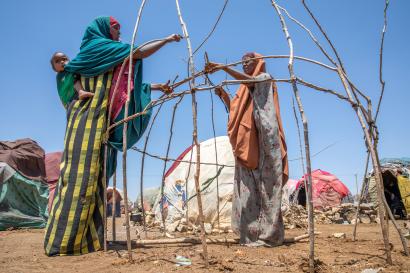
The intense and worsening drought in Somalia is having a devastating impact on Somalia’s population. Recent research in Somalia by Mercy Corps and ACDI/VOCA, and funded by USAID, found households have experienced total or near total loss of livestock and agricultural resources and assets, resulting in high reliance on external assistance for survival. Households adopted negative coping strategies to cope with the drought, such as reducing food consumption, taking their children out of school, and engaging in risky or environmentally damaging livelihood activities such as charcoal burning. There is also early evidence of the drought’s downstream effects – divorce and intimate partner violence, and child marriage. Women and girls are particularly hard hit due to their existing vulnerabilities, gender-based discrimination and inequality, and are at increasing risk of hunger and malnutrition, loss of income, and gender-based violence.
About the Somalia Resilience Population Measurement Activity
Somalia Resilience Population Measurement (RPM) Activity is a 5-year USAID-funded project implemented by Mercy Corps with ACDI/VOCA. It seeks to improve upon approaches to resilience measurement in order to inform program adaptation and decision-making among implementers, donors, and government representatives. This $9 million USD program is designed to collaboratively explore and test solutions for user-centered resilience measurement in USAID’s Country Development Cooperation Strategy (CDCS) Focal Zone (comprised of Banadir most of the Southwest State, and extends to limited areas in Hirshabelle State and Jubaland State).
Current projections suggest that as many as 6.7 million people across Somalia will face Crisis (Integrated Phase Classification (IPC) Phase 3) or worse food insecurity outcomes during the last quarter of 2022. As the likelihood of famine is rapidly becoming a reality, the Somalia RPM Activity has conducted qualitative and quantitative data collection in response to the ongoing drought to better understand if and how households are coping during the crisis.
The program will use population-level resilience measurement and a participatory approach to facilitate the use of resilience-oriented results frameworks as a common entry point to unpack resilience learning questions. RPM research activities consist of two intertwined components:
- a panel survey that will trace a diverse set of livelihood groups over five years, and
- a recurrent monitoring survey, with alternative periods of qualitative and quantitative data collection.
Through the RPM activities, Mercy Corps and its partners will explore the extent to which resilience capacities and wellbeing outcomes change over time and probe how resilience stakeholders in the USAID’s Focal Zone may or may not be contributing to this change. RPM will help aid stakeholders better align their interventions in a shared resilience vision, strengthening the foundations for collective impact in Somalia’s recurrent and protracted crisis context.
It became harder to cope with the drought after our food was finished and we lost our animals. Then it forced us to leave our beloved location to areas where we hoped to get support. Now we are vulnerable with no support, and we are unable to cope with the current drought’.
Male focus groups participant, Dondardir IDP, July 2022
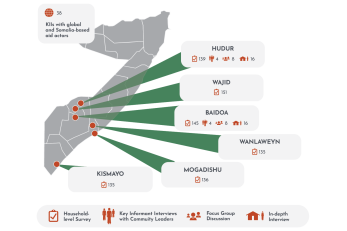
Our Results and Impact
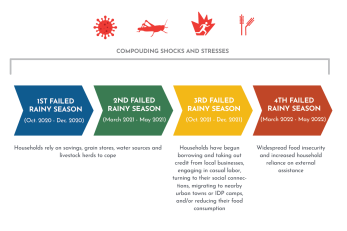

-
90%
-
2 meals a day
-
85%
How we work
Mercy Corps, in conjunction with ACDI/VOCA was challenged by USAID’s vision to collaboratively explore and test solutions for user-centered resilience measurement in USAID’s focal zone through the RPM, which aims to develop and lead a resilience measurement system measuring the collective resilience outcomes at a population level and build the capacity of participating stakeholders to estimate individual contributions to collective resilience outcomes. This work will require the adaptation of single-program-focused resilience capacity measurement methodologies previously piloted in Somalia, and advanced analytics required to link diverse stakeholder-level contributions to collective, population-level, resilience outcomes.
Through a common measurement and analytics process, all resilience stakeholders in the targeted geographic zone, including aid actors, donors, government, and social enterprises, can have the opportunity to track progress of their collective resilience outcomes and access tools necessary to estimate their individual contributions to those outcomes.
RPM will enhance the learning and adaptation of diverse resilience actors across a geographic area containing over one third of Somalia’s population, providing a public good and groundwork for similar government-led efforts. Further, this work will advance global methodological best practices in Resilience Measurement and population-level evaluations of collective outcomes. Notably, it can develop a replicable approach for connecting population level measurement of common resilience outcomes to the work of diverse contributing actors, thus meeting a measurement aspiration for USAID’s Bureau of Resilience and Food Security and resilience collaboration platforms in other USAID resilience focal countries.
Resources
The Somalia RPM Activity has conducted qualitative & quantitative data collection in response to the ongoing drought to better understand if & how households are coping during the crisis. Includes key findings & recommendations to the recurring monitoring survey (RMS) questions:
- What does effective coping mean in the context of the current drought?
- How are households relying on social networks to cope with the current drought?
- What are some of the main psychosocial determinants of household resilience against shocks?
- Assessing Communities' Coping Strategies During the Current Drought in Somalia: Research Brief (USAID RPM Activity)
- Role of Mental & Psychosocial Wellbeing and Support in Household Resilience in Somalia: Research Brief (USAID RPM Activity)
- Role of Social Networks in Coping with the Current Drought in Somalia: Research Brief (USAID RPM Activity)
- The formative research, a literature review, identified six capacities that are critical to resilience in Somalia as well as key considerations for RPM’s approach to resilience measurement in the Focal Zone.
- This brief outlines key findings and recommendations from the formative round of the recurring monitoring survey.
Saving Lives and Building Resilience: Evidence on how we can do both in Somalia
Somalia Resilience Population-Level Measurement Activity (RPM) Fact Sheet
- This brief highlights learning from the Somalia Resilience Partnership (SRP) recent discussion on why Scenario Planning is important in fragile contexts, like Somalia. Includes lessons from World Vision International.
The Resilience Recurrent Monitoring System (RMS): A Landscape Review
- A key resilience measurement tool is the recurrent monitoring system (RMS). The REAL Award brings together global RMS designers and consumers to explore RMS implementation challenges and put forth recommendations for RMS application in humanitarian, development, and peacebuilding programs.
Resilience Measurement Practical Guidance Series: Note 6: Recurrent Monitoring Surveys
- Introduces development practitioners to key considerations for setting up and deploying an RMS. Provides guidance on: whether to deploy an RMS; methodological considerations for design; planning and budgeting.
